Top Rankings
St. Francis Area Schools School District ranks among the top 20% of public school district in Minnesota for:
Category
Attribute
Community Size
Largest student body (number of students) (Top 1%)
For the 2025 school year, there are 8 public elementary schools serving 2,707 students in St. Francis Area Schools School District. This district's average elementary testing ranking is 5/10, which is in the bottom 50% of public elementary schools in Minnesota.
Public Elementary Schools in St. Francis Area Schools School District have an average math proficiency score of 41% (versus the Minnesota public elementary school average of 47%), and reading proficiency score of 50% (versus the 51% statewide average).
Minority enrollment is 20% of the student body (majority Asian and Hispanic), which is less than the Minnesota public elementary school average of 40% (majority Black and Hispanic).
Overview
This School District
This State (MN)
# Schools
15 Schools
1,655 Schools
# Students
4,236 Students
571,925 Students
# Teachers
270 Teachers
40,363 Teachers
Student : Teacher Ratio
16:1
16:1
District Rank
St. Francis Area Schools School District, which is ranked within the bottom 50% of all 522 school districts in Minnesota (based off of combined math and reading proficiency testing data) for the 2021-2022 school year.
The school district's graduation rate of 89% has stayed relatively flat over five school years.
Overall District Rank
#253 out of 527 school districts
(Top 50%)
(Top 50%)
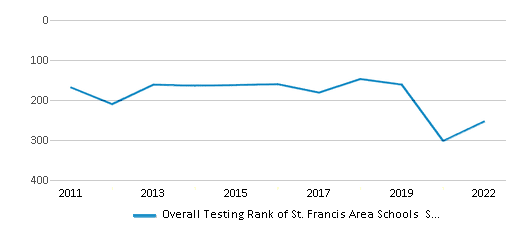
Math Test Scores (% Proficient)
39%
45%
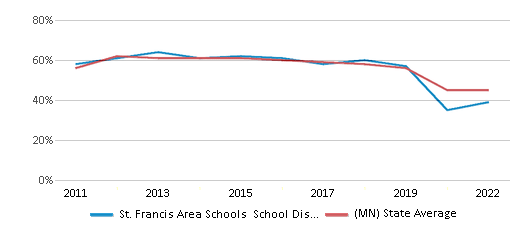
Reading/Language Arts Test Scores (% Proficient)
50%
51%
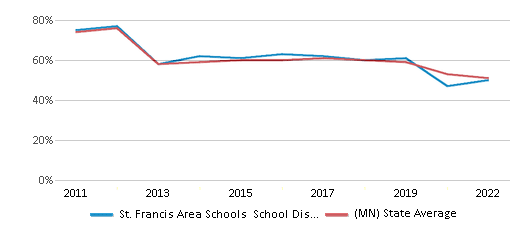
Science Test Scores (% Proficient)
41%
41%
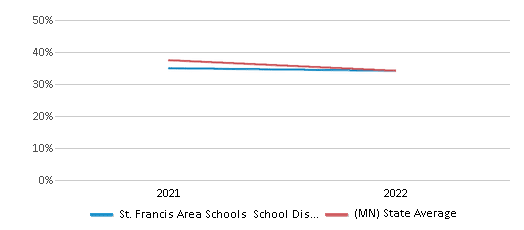
Graduation Rate
89%
84%
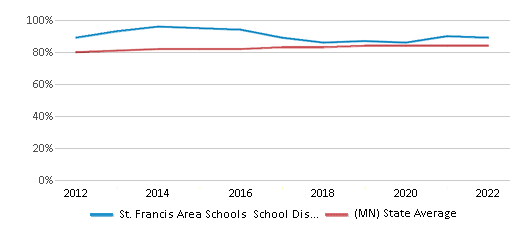
Students by Ethnicity:
Diversity Score
0.35
0.61
# American Indian Students
27 Students
10,480 Students
% American Indian Students
1%
2%
# Asian Students
280 Students
42,165 Students
% Asian Students
7%
7%
# Hispanic Students
214 Students
65,127 Students
% Hispanic Students
5%
12%
# Black Students
54 Students
70,794 Students
% Black Students
1%
12%
# White Students
3,388 Students
344,281 Students
% White Students
80%
60%
# Hawaiian Students
4 Students
676 Students
% Hawaiian Students
n/a
n/a
# Two or more races Students
269 Students
38,402 Students
% of Two or more races Students
6%
7%
Students by Grade:
# Students in PK Grade:
104
10,698
# Students in K Grade:
259
57,031
# Students in 1st Grade:
289
61,859
# Students in 2nd Grade:
325
63,560
# Students in 3rd Grade:
288
61,751
# Students in 4th Grade:
319
63,575
# Students in 5th Grade:
301
63,290
# Students in 6th Grade:
327
63,180
# Students in 7th Grade:
339
53,666
# Students in 8th Grade:
318
53,924
# Students in 9th Grade:
323
4,107
# Students in 10th Grade:
343
4,634
# Students in 11th Grade:
342
4,740
# Students in 12th Grade:
359
5,910
# Ungraded Students:
-
-
District Revenue and Spending
The revenue/student of $15,462 in this school district is less than the state median of $17,854. The school district revenue/student has stayed relatively flat over four school years.
The school district's spending/student of $17,805 is less than the state median of $18,580. The school district spending/student has stayed relatively flat over four school years.
Total Revenue
$66 MM
$15,547 MM
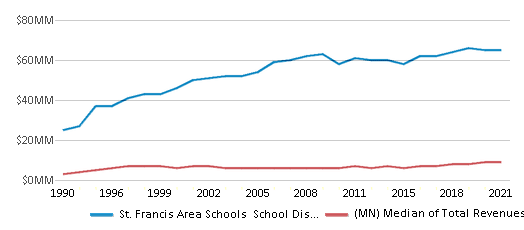
Spending
$75 MM
$16,179 MM
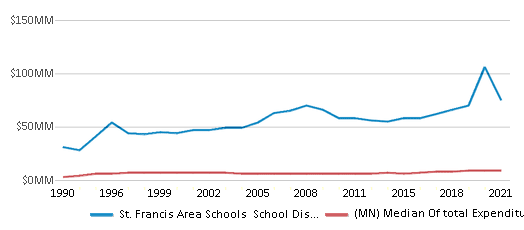
Revenue / Student
$15,462
$17,854
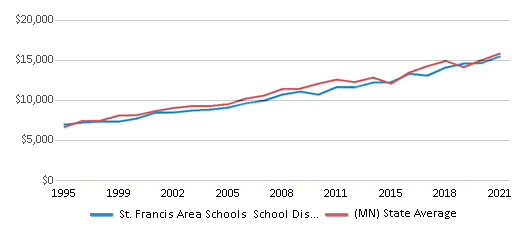
Spending / Student
$17,805
$18,580
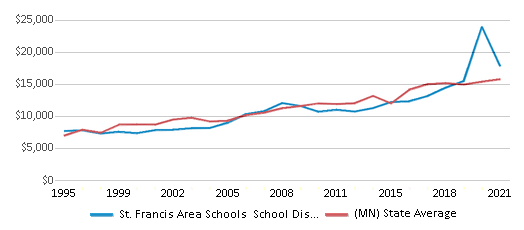
Best St. Francis Area Schools School District Public Elementary Schools (2025)
School
(Math and Reading Proficiency)
(Math and Reading Proficiency)
Location
Grades
Students
Rank: #11.
St. Francis Elementary School
(Math: 62% | Reading: 61%)
Rank:
Rank:
9/
Top 20%10
22919 St. Francis Blvd
Saint Francis, MN 55070
(763) 213-8671
Saint Francis, MN 55070
(763) 213-8671
Grades: K-5
| 635 students
Rank: #22.
Cedar Creek Elementary School
(Math: 51% | Reading: 54%)
Rank:
Rank:
8/
Top 30%10
21108 Ne Polk St
Cedar, MN 55011
(763) 213-8781
Cedar, MN 55011
(763) 213-8781
Grades: K-5
| 663 students
Rank: #33.
Crossroads School
Alternative School
(Math: <50% | Reading: <50%)
Rank:
Rank:
7/
Top 50%10
22426 St. Francis Blvd Nw
Anoka, MN 55303
(763) 753-7023
Anoka, MN 55303
(763) 753-7023
Grades: K-12
| 11 students
Rank: #44.
East Bethel Elementary School
(Math: 48% | Reading: 50%)
Rank:
Rank:
6/
Top 50%10
21210 Polk St Ne
Cedar, MN 55011
(763) 213-8901
Cedar, MN 55011
(763) 213-8901
Grades: K-5
| 478 students
Rank: #55.
Saints Online Middle School
(Math: ≤20% | Reading: <50%)
Rank:
Rank:
4/
Bottom 50%10
4111 Ambassador Blvd Nw
Saint Francis, MN 55070
(763) 753-7152
Saint Francis, MN 55070
(763) 753-7152
Grades: 6-8
| 13 students
Rank: #66.
St. Francis Middle School
(Math: 27% | Reading: 45%)
Rank:
Rank:
3/
Bottom 50%10
23065 Saint Francis Blvd Nw
Saint Francis, MN 55070
(763) 213-8501
Saint Francis, MN 55070
(763) 213-8501
Grades: 6-8
| 896 students
Rank: n/an/a
Restore Program
Special Education School
4111 Ambassador Blvd Nw
Saint Francis, MN 55070
(763) 753-7046
Saint Francis, MN 55070
(763) 753-7046
Grades: K-12
| 6 students
Rank: n/an/a
4111 Ambassador Blvd Nw
Saint Francis, MN 55070
(763) 753-7152
Saint Francis, MN 55070
(763) 753-7152
Grades: K-5
| 5 students
Recent Articles

Year-Round Or Traditional Schedule?
Which is more appropriate for your child? A year-round attendance schedule or traditional schedule? We look at the pros and cons.

Why You Should Encourage Your Child to Join a Sports Team
Participating in team sports has a great many benefits for children, there is no doubt. In this article you will learn what those benefits are.

White Students are Now the Minority in U.S. Public Schools
Increasing birth rates among immigrant families from Asia and Central and South America, combined with lower birth rates among white families, means that for the first time in history, public school students in the United States are majority-minority. This shift in demographics poses difficulties for schools as they work to accommodate children of varying language abilities and socio-economic backgrounds.





